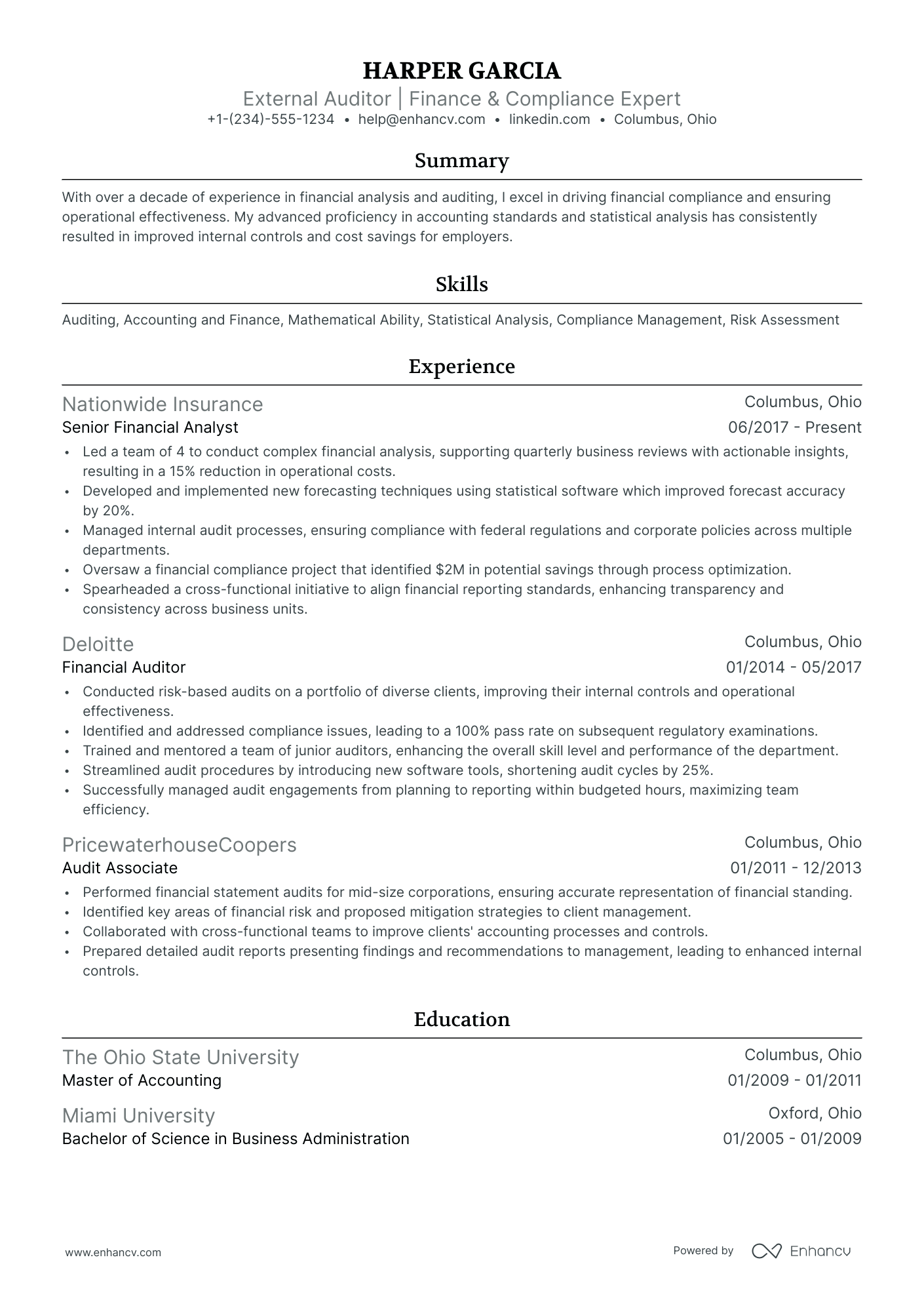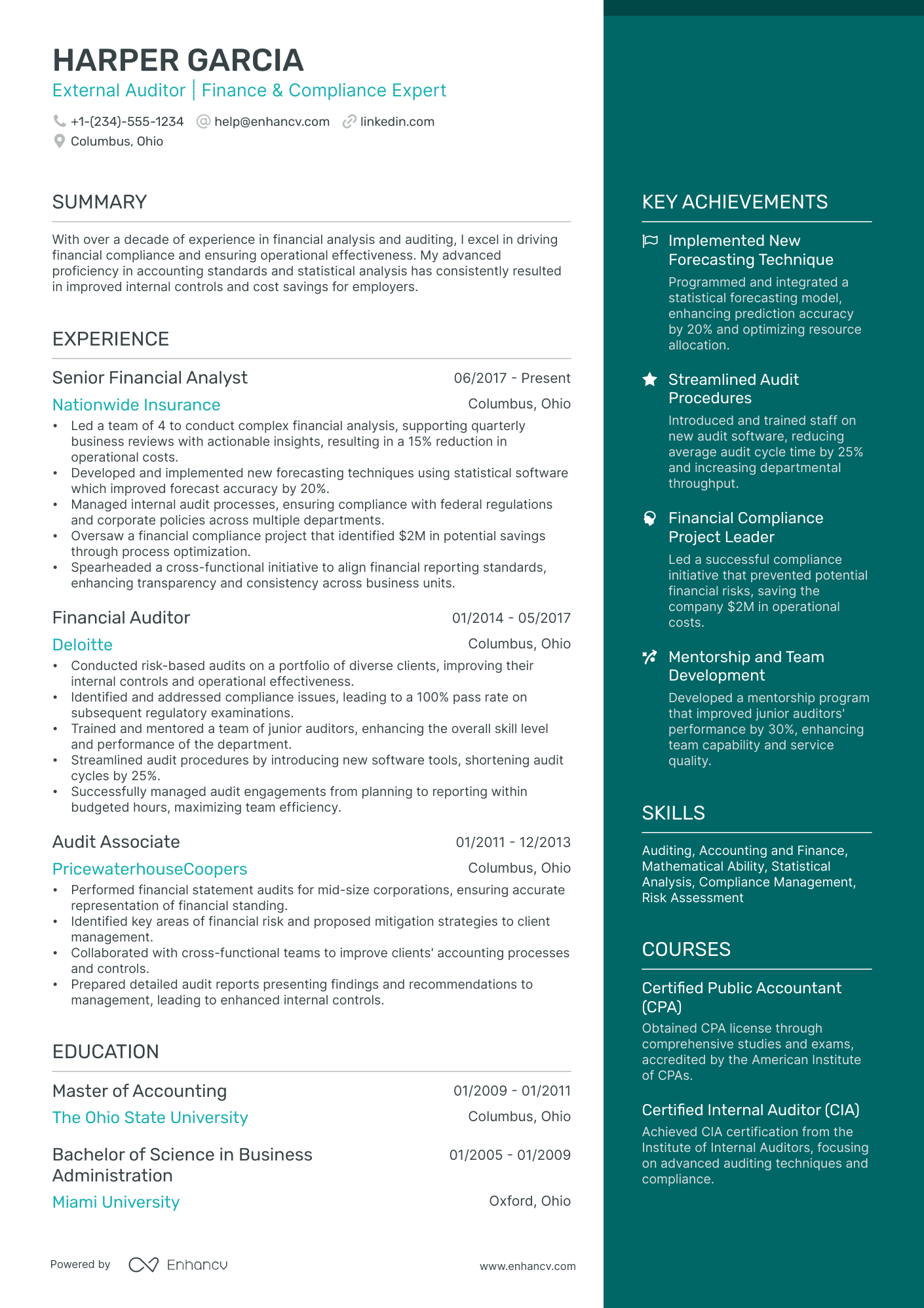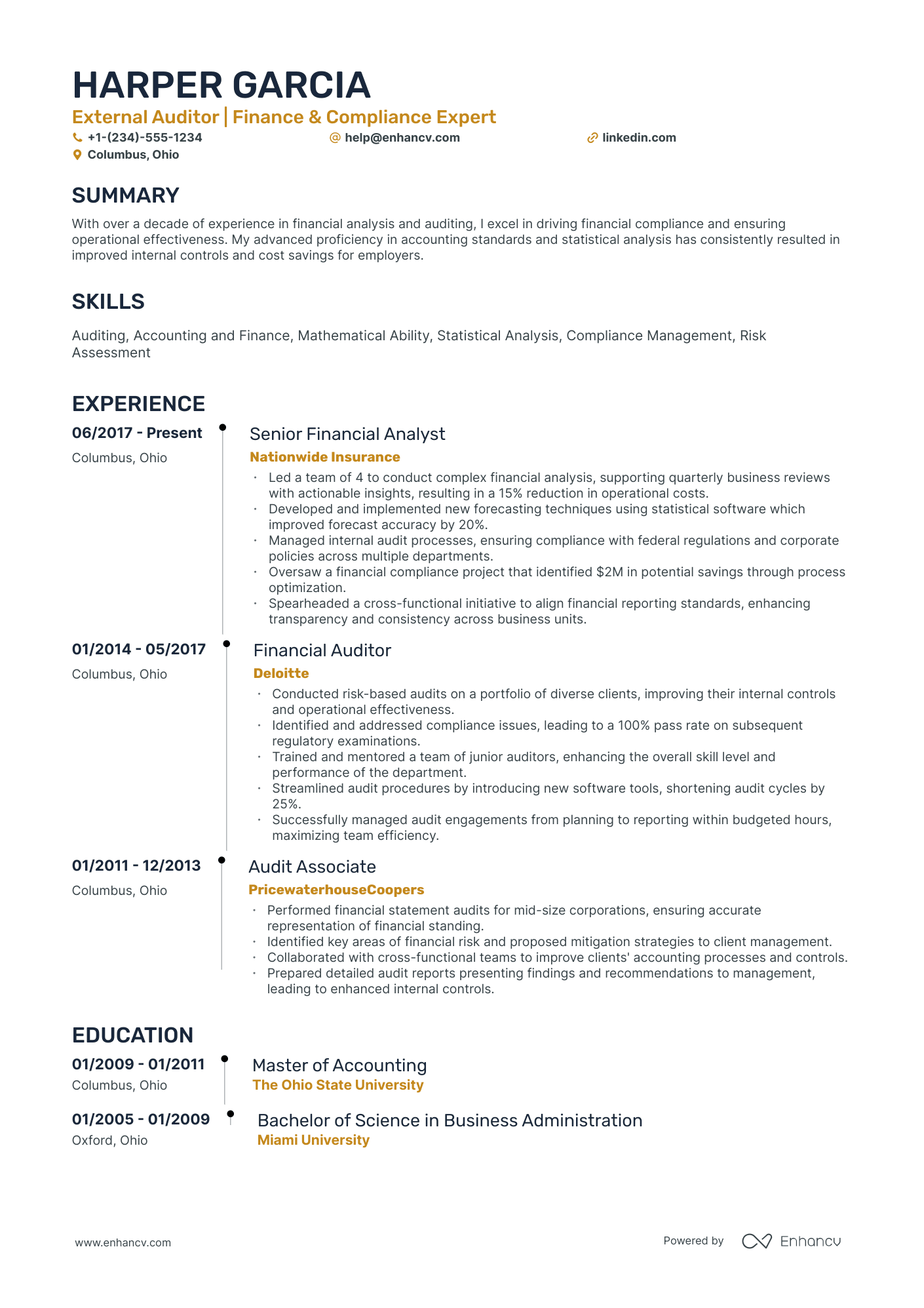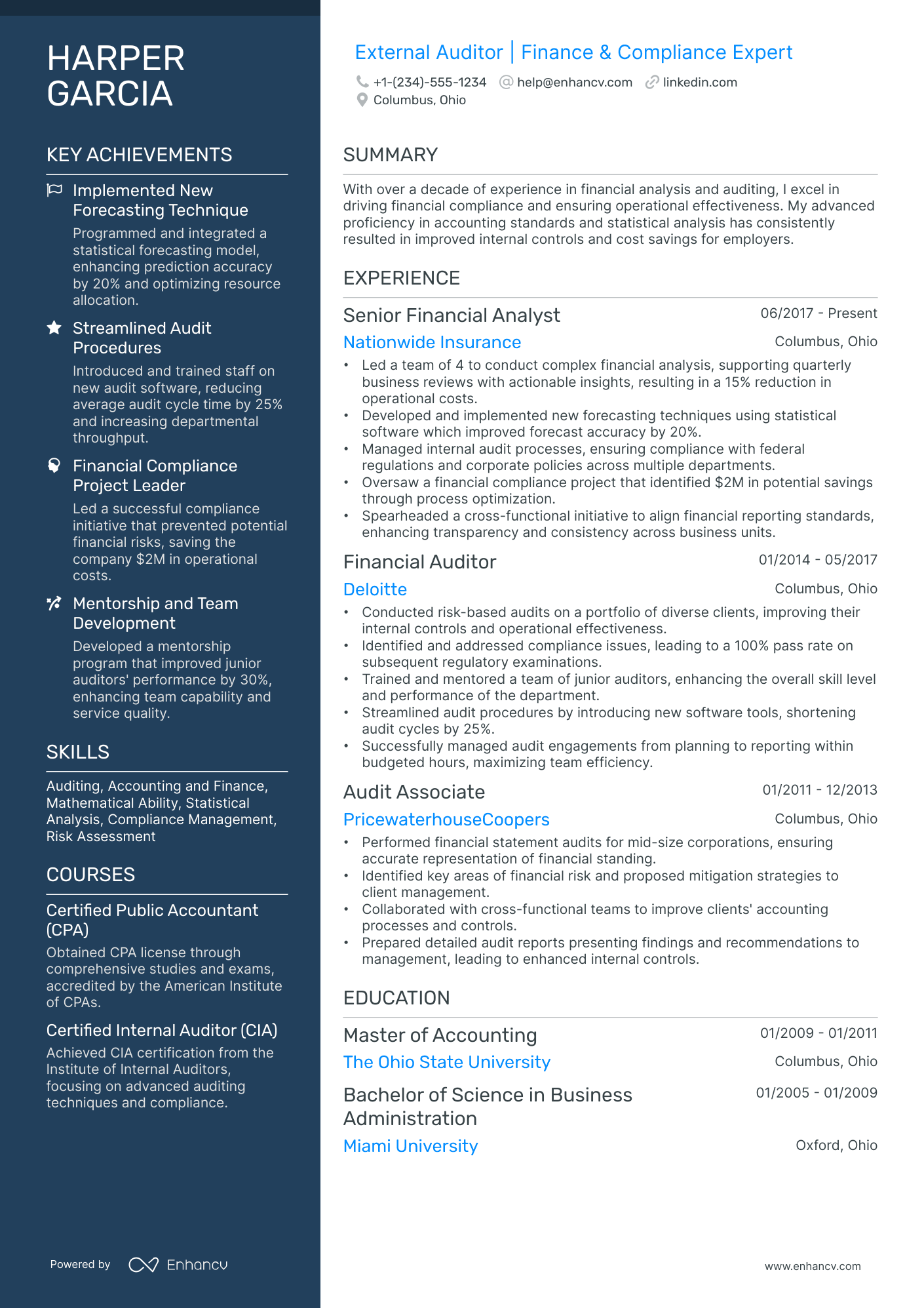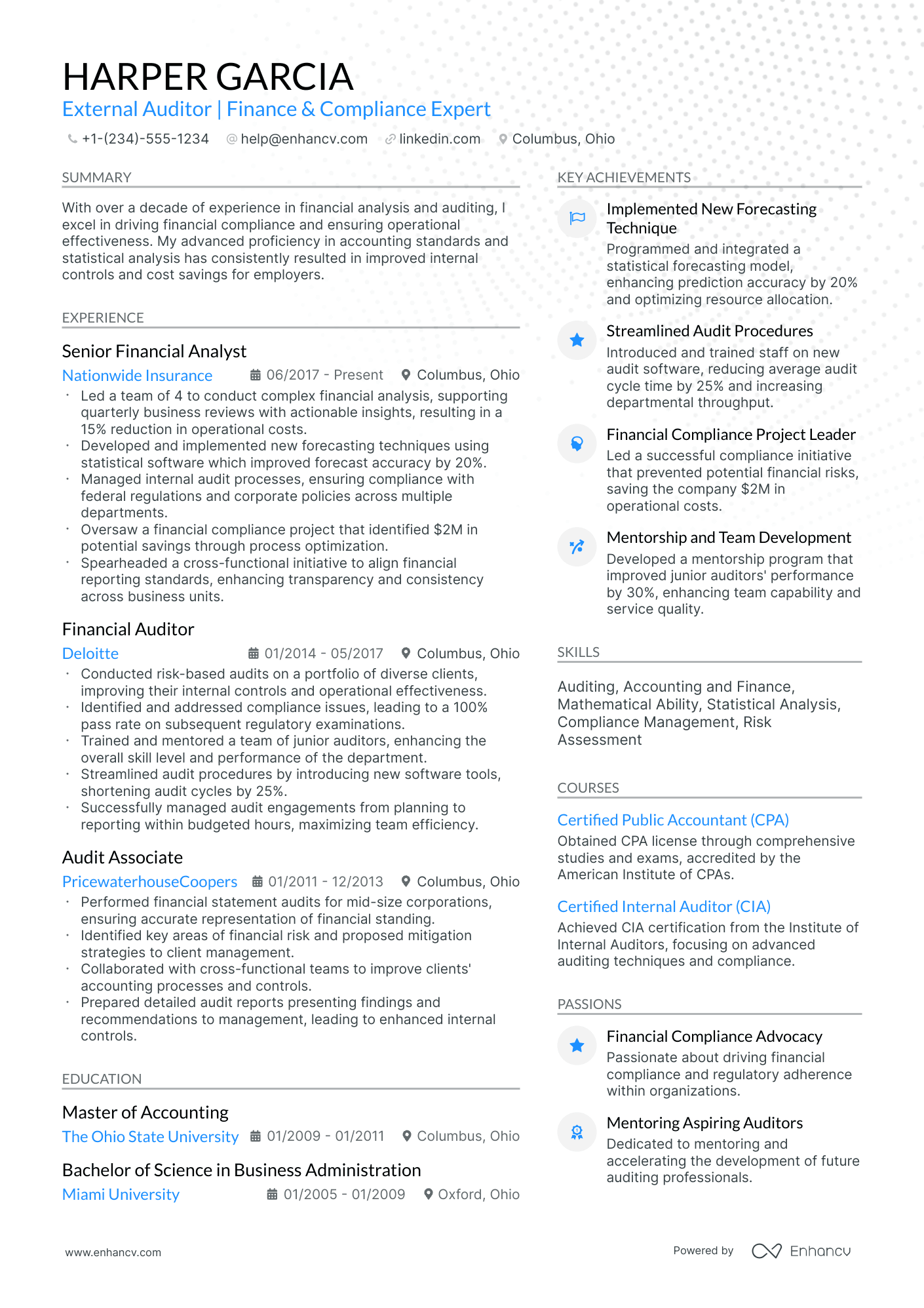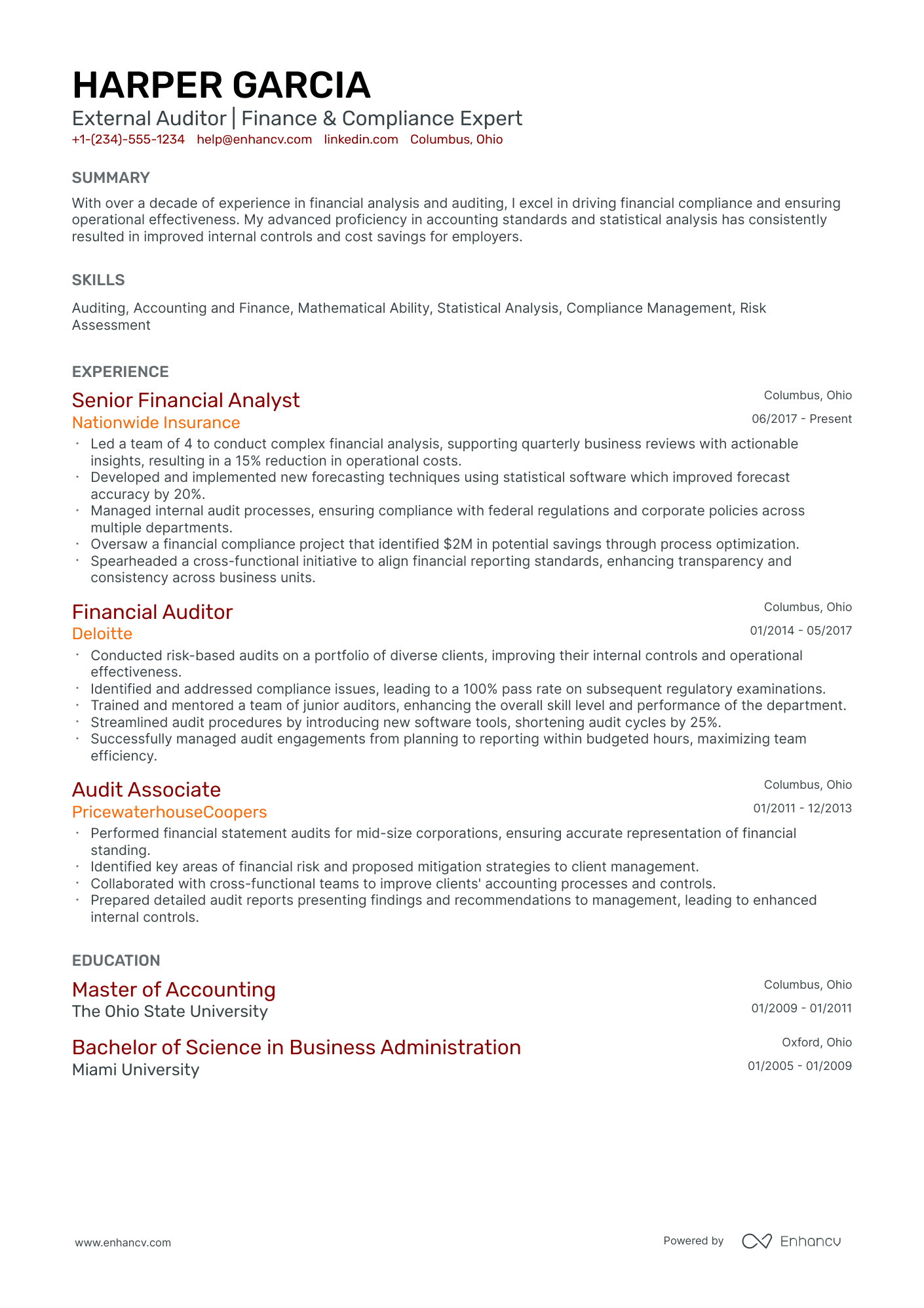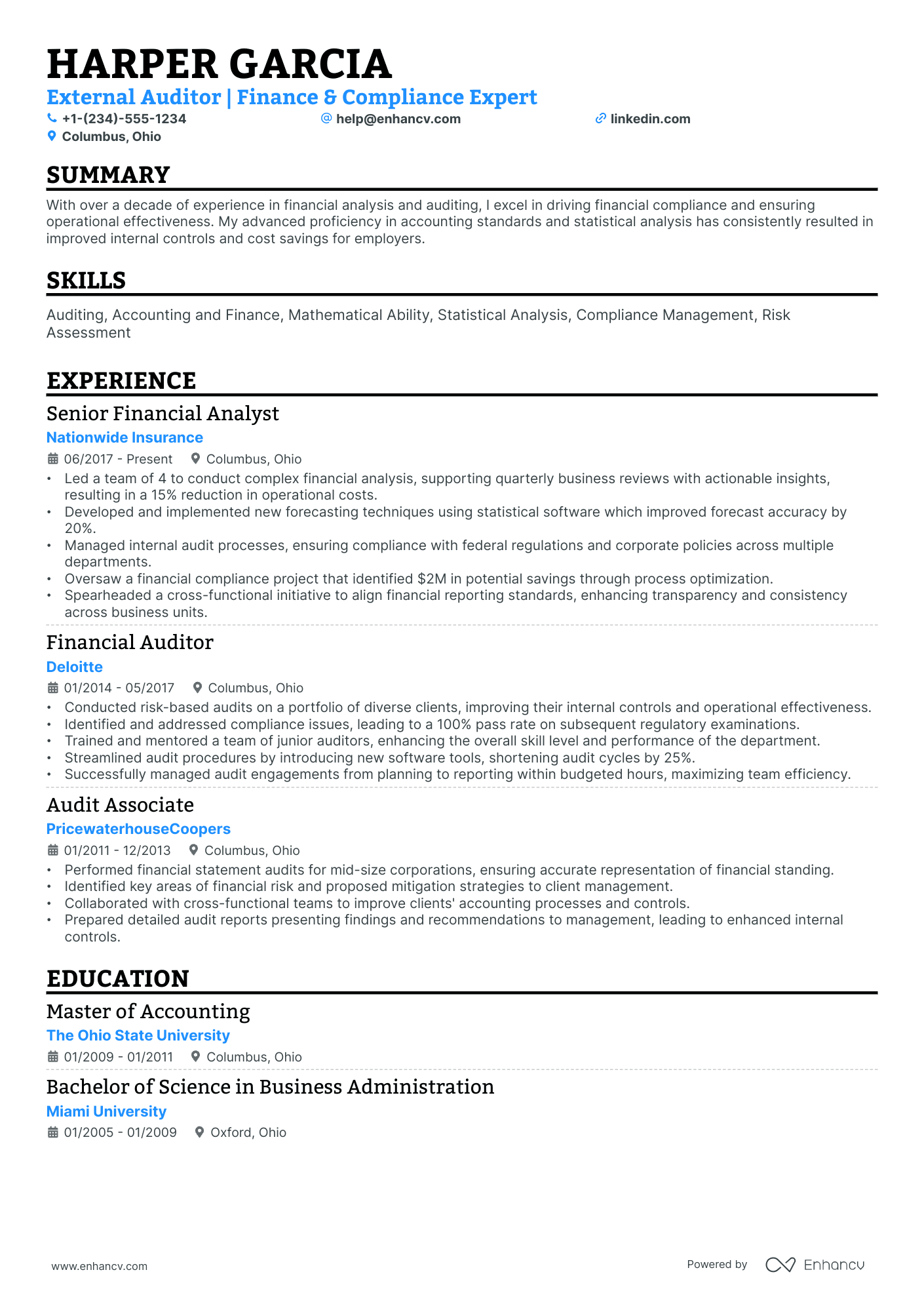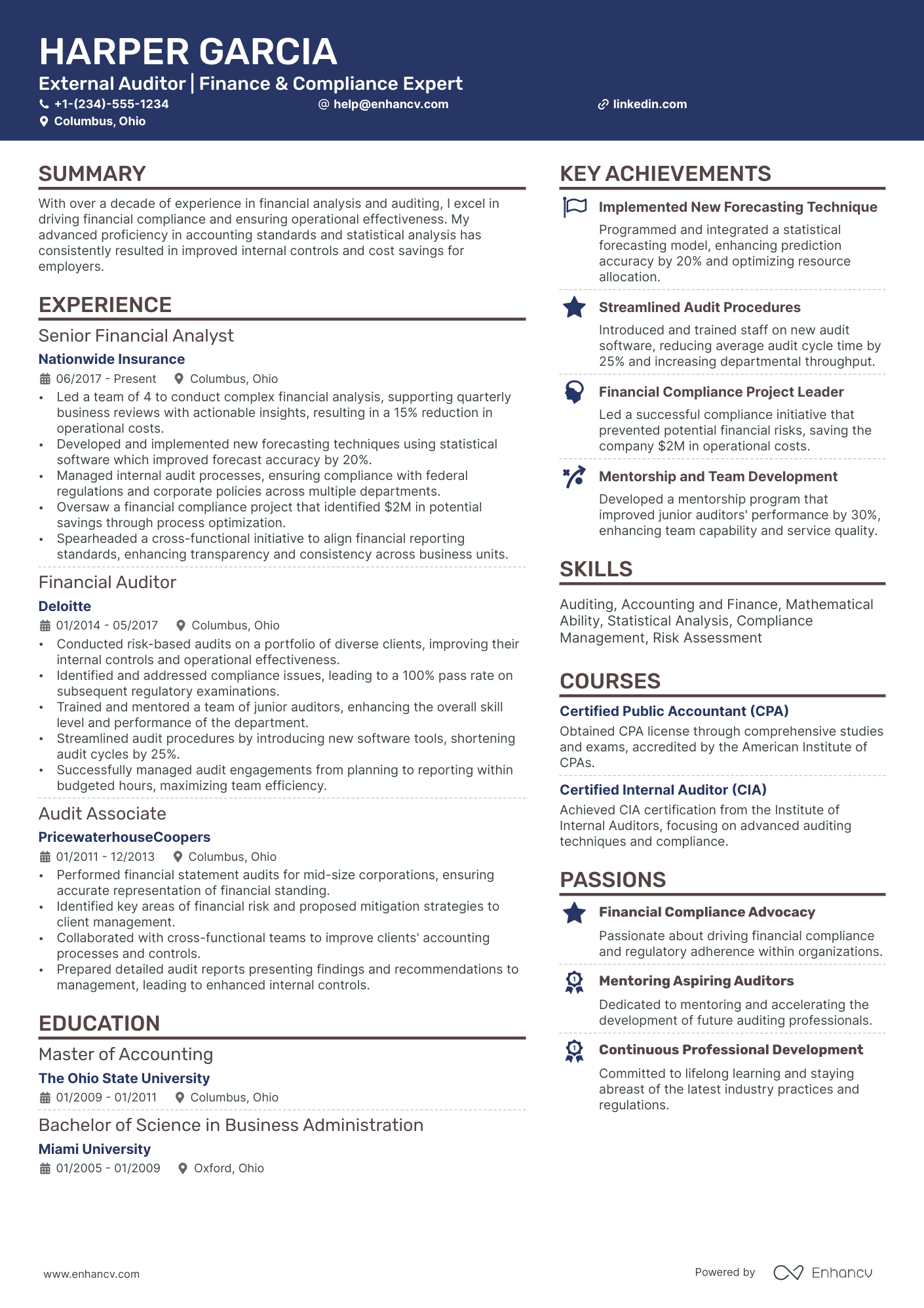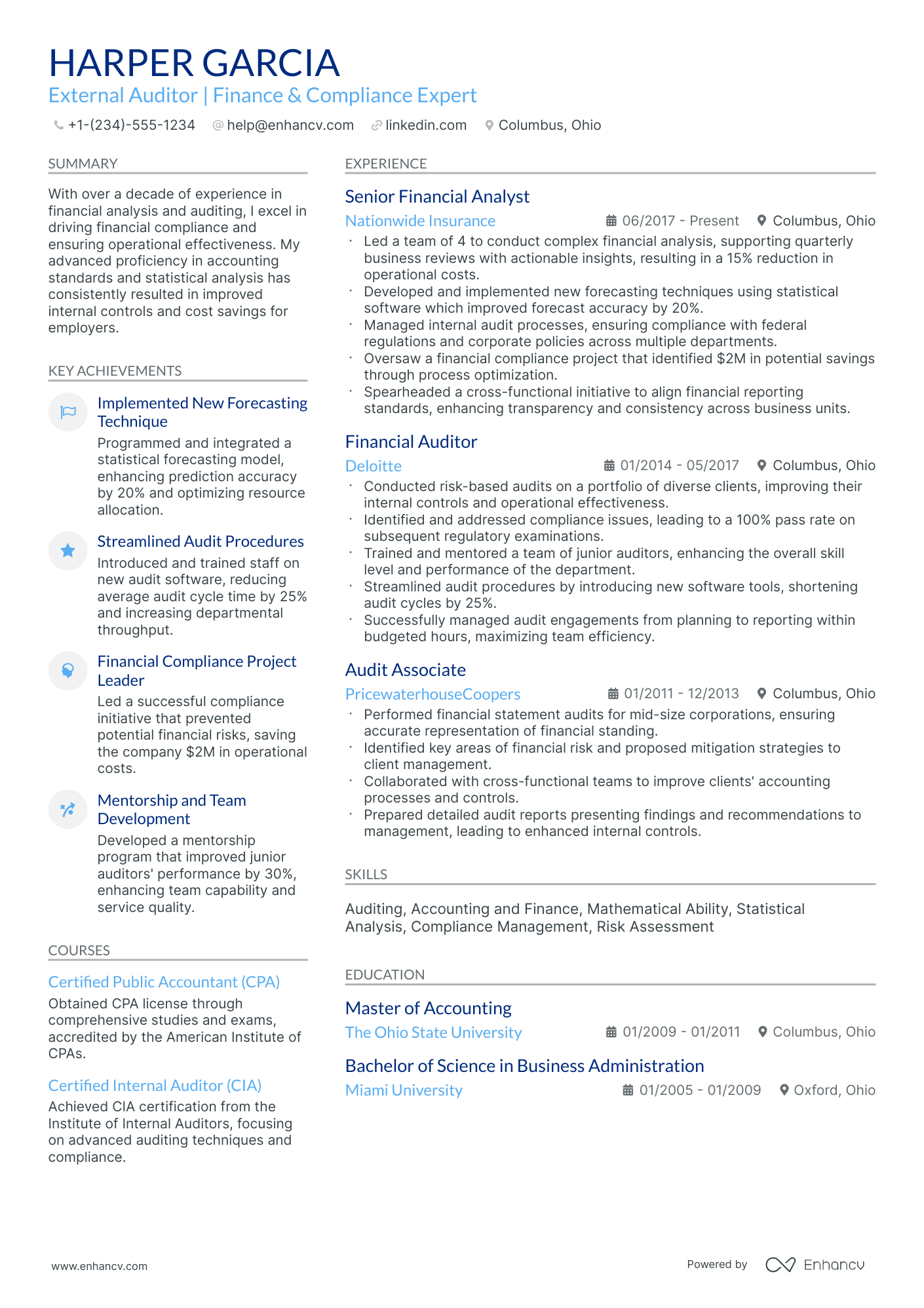As an external auditor, one common resume challenge you may encounter is effectively demonstrating your ability to adapt to diverse audit environments and regulations. Our guide is tailored to help you articulate this skill, ensuring that potential employers recognize your versatility and compliance expertise in a competitive job market.
- Which sections do you need to include in your resume to meet recruiters' requirements;
- How to write your external auditor resume experience section - even if you have don't have little to no work experience;
- Real-life professional examples to guide you how to write the most important external auditor resume sections;
- Adding even more sections so your external auditor resume stands out with professionalism and your personality.
We've also selected some of the best (and most relevant) resume guides for the external auditor role you're applying for:
- Bookkeeper Resume Example
- Finance Specialist Resume Example
- Tax Manager Resume Example
- Risk Manager Resume Example
- Accounts Receivable Resume Example
- Financial Management Specialist Resume Example
- Account Executive Resume Example
- Financial Consultant Resume Example
- Accounting Assistant Resume Example
- Payroll Director Resume Example
Best practices for the look and feel of your external auditor resume
Before you even start writing your external auditor resume, first you need to consider its layout and format.
What's important to keep in mind is:
- The reverse-chronological resume is the most widely used format to present your experience, starting with your latest job.
- Your external auditor resume header needs to include your correct, professional contact details. If you happen to have a professional portfolio or an updated LinkedIn profile, include a link to it.
- Ensure your resume is no longer than two pages - you don't have to include irelevant experience on your resume just to make it look longer.
- Unless specified otherwise, submit your resume in the most popular format, the PDF one, as this will ensure your external auditor resume isn't altered.
Remember, resume layouts can vary by country – for example, a Canadian resume format could look different.
Upload & Check Your Resume
Drop your resume here or choose a file. PDF & DOCX only. Max 2MB file size.
PRO TIP
If you happen to have some basic certificates, don't invest too much of your external auditor resume real estate in them. Instead, list them within the skills section or as part of your relevant experience. This way you'd ensure you meet all job requirements while dedicating your certificates to only the most in-demand certification across the industry.
Essential sections that should make up your external auditor resume include:
- The header - with your contact details (e.g. email and telephone number), link to your portfolio, and headline
- The summary (or objective) - to spotlight the peaks of your professional career, so far
- The experience section - with up to six bullets per role to detail specific outcomes
- The skills list - to provide a healthy mix between your personal and professional talents
- The education and certification - showing your most relevant degrees and certificates to the external auditor role
What recruiters want to see on your resume:
- Demonstrated knowledge of Generally Accepted Auditing Standards (GAAS) and accounting principles
- Experience with risk assessment and financial reporting
- Proven ability to use auditing software and technologies
- Detail-oriented with strong analytical and problem-solving skills
- Excellent communication and interpersonal skills, with experience in client relations and team leadership
The external auditor resume experience section: a roadmap to your expertise
The resume experience section provides you with an opportunity to tell your professional narrative.
Recruiters, reading between the lines of your resume, use the experience section to better understand your unique skill set, accomplishments, and what unique value you bring about.
Discover five quick steps on how to write your experience section:
- Curate only relevant experience items to the role and include the company, description, and dates; all followed by up to six bullets per experience item;
- Each experience item should feature tangible results of your actions - if you can include a number or percent, this will further highlight your aptitude;
- If you've received any managerial or customer feedback, use short excerpts of it as further social proof of your technical or people skills;
- Make sure you're using the appropriate verb tense when listing your responsibilities;
- Within the description for each role, you could summarize your most noteworthy and relevant achievements.
Now, take note of how a real-world external auditor professional received opportunities at industry leaders with these resume experience sections:
- Led over 50 external audit projects for high-profile tech clients, increasing department accuracy by 30% and efficiency by 20% through the adoption of advanced data analytics tools.
- Managed and trained a team of 12 auditors, fostering a collaborative environment that contributed to a 15% decrease in staff turnover and a higher quality of audit findings.
- Developed a comprehensive risk assessment framework that reduced missed financial discrepancies by 25%, thereby enhancing the reliability of financial reporting for our clients.
- Spearheaded a large-scale forensic audit investigation for a multinational corporation, uncovering financial misstatements that led to the recovery of $2 million in misappropriated funds.
- Piloted the integration of new auditing software, shortening the audit cycle by 10 days and saving the firm approximately $50,000 annually in labor costs.
- Navigated complex tax law implications for global entities, ensuring full compliance and avoiding potential fines of up to $1 million for our clients.
- Effectively communicated audit findings to C-level executives, which influenced company decisions and strategic planning, resulting in a 5% reduction in operational costs.
- Improved the audit process by implementing lean methodologies, cutting out redundant processes, and resulting in time savings of up to 200 hours per audit project.
- Drafted and presented detailed audit reports, which provided actionable insights that helped companies realign their financial strategies and improve their bottom line.
- Conducted comprehensive external audits for non-profit organizations, identifying and rectifying misallocations of funds amounting to over $500,000.
- Expertly analyzed financial statements and led audit engagements that significantly enhanced the financial transparency and accountability for stakeholders.
- Introduced new analytical procedures that optimized the audit process for small businesses, achieving a 20% quicker turnaround time on average.
- Orchestrated a cross-functional team effort on a large merger, ensuring seamless integration of financial reporting systems, and resulting in zero post-merger audit adjustments.
- Achieved a 100% client satisfaction rate by delivering comprehensive and understandable audit insights, which helped clients enhance their internal control systems.
- Consistently maintained a billable utilization rate above 90%, reflecting exceptional time management and dedication to client service across all assigned audit engagements.
- Devised and executed operational audits for manufacturing clients, uncovering inefficiencies in the supply chain that led to cost savings of approximately $750,000 over two fiscal years.
- Collaborated with IT specialists to integrate cybersecurity assessments into audit plans, significantly reducing the risk of financial losses due to data breaches.
- Provided expert witness testimony in litigation cases concerning financial irregularities, bolstering the firm's reputation for forensic auditing excellence.
- Routinely assessed and provided guidance on the internal controls of publicly traded companies, preparing them for Sarbanes-Oxley (SOX) compliance and reducing the risk of non-compliance penalties.
- Implemented a custom-designed continuous auditing program, providing real-time insights into clients' financial health and improving the speed of decision-making.
- Facilitated training workshops on new financial legislation for clients, staying ahead of regulatory changes and securing the firm's position as an industry thought leader.
- Managed a portfolio of small to mid-sized enterprise audits, tailoring approaches to each client's unique business model, and delivering personalized financial advice.
- Championed a paperless audit initiative, leading to an environmentally friendly approach and a 15% cost reduction in printing and document storage.
- Proactively identified tax-saving opportunities for clients during routine audits, leading to an average of $300,000 in annual tax savings for those businesses.
Quantifying impact on your resume
- List the number of audits you have conducted to demonstrate your extensive experience in the field.
- Include the dollar amount of financial discrepancies you've identified to show your effectiveness in uncovering fiscal errors.
- Specify the percentage of cost savings achieved from your recommendations to highlight your contribution to improving financial efficiency.
- Mention the number of regulatory compliance issues you've resolved to underline your expertise in maintaining legal standards.
- Indicate the number of audit reports you have completed to showcase your productivity and work ethic.
- Describe the scale of operations you've audited by including the total assets or revenue of the audited entities to reflect your capability to handle large and complex audits.
- Detail the number of audit team members you've led or trained to establish your leadership and mentoring abilities.
- Report the percentage of audit recommendations implemented by the client to evidence the value and impact of your audit findings.
Action verbs for your external auditor resume
What to do if you don't have any experience
It's quite often that candidates without relevant work experience apply for a more entry-level role - and they end up getting hired.
Candidate resumes without experience have these four elements in common:
- Instead of listing their experience in reverse-chronological format (starting with the latest), they've selected a functional-skill-based format. In that way, external auditor resumes become more focused on strengths and skills
- Transferrable skills - or ones obtained thanks to work and life experience - have become the core of the resume
- Within the objective, you'd find career achievements, the reason behind the application, and the unique value the candidate brings about to the specific role
- Candidate skills are selected to cover basic requirements, but also show any niche expertise.
Recommended reads:
PRO TIP
The more trusted the organization you've attained your certificate (or degree) from, the more credible your skill set would be.
Bringing your external auditor hard skills and soft skills to the forefront of recruiters' attention
Hard skills are used to define the technological (and software) capacities you have in the industry. Technical skills are easily defined via your certification and expertise.
Soft skills have more to do with your at-work personality and how you prosper within new environments. People skills can be obtained thanks to your whole life experience and are thus a bit more difficult to define.
Why do recruiters care about both types of skills?
Hard skills have more to do with job alignment and the time your new potential employers would have to invest in training you.
Soft skills hint at how well you'd adapt to your new environment, company culture, and task organization.
Fine-tune your resume to reflect on your skills capacities and talents:
- Avoid listing basic requirements (e.g. "Excel"), instead substitute with the specifics of the technology (e.g. "Excel Macros").
- Feature your workplace values and ethics as soft skills to hint at what matters most to you in a new environment.
- Build a separate skills section for your language capabilities, only if it makes sense to the role you're applying for.
- The best way to balance external auditor hard and soft skills is by building a strengths or achievements section, where you define your outcomes via both types of skills.
There are plenty of skills that could make the cut on your resume.
That's why we've compiled for you some of the most wanted skills by recruiters, so make sure to include the technologies and soft skills that make the most sense to you (and the company you're applying for):
Top skills for your external auditor resume:
Financial Reporting Standards
Audit Software (e.g., ACL, IDEA)
Microsoft Excel
Data Analytics Tools
Accounting Software (e.g., QuickBooks, SAP)
Risk Assessment Techniques
Tax Compliance Knowledge
Financial Statement Analysis
Forensic Accounting Techniques
Regulatory Compliance Knowledge
Attention to Detail
Analytical Thinking
Effective Communication
Problem-Solving
Time Management
Team Collaboration
Client Relationship Management
Ethical Judgment
Adaptability
Critical Thinking
PRO TIP
Highlight any significant extracurricular activities that demonstrate valuable skills or leadership.
What are the best certificates to add to your external auditor resume + how to curate your education section
The education and certification resume sections are the underdogs of your external auditor resume.
They showcase to recruiters that you've invested plenty of time to gain valuable and specific know-how, vital for growth.
As far as the resume education section is concerned:
- Detail only advanced education, specifying the institution and timeframe.
- Indicate your forthcoming graduation date if you're in the midst of your studies.
- Consider omitting degrees that don't align with the job's requirements.
- Offer a description of your academic journey if it underscores your notable achievements.
When curating your degrees and certificates on your external auditor resume:
- Select only accreditation that matters to the role
- Niche knowledge that could help you stand out as a candidate (as is within the past few years), should be listed towards the top of your resume
- Include any pertinent data for credibility (e.g. institute name, graduation dates, etc.)
- Irrelevant degrees and certifications shouldn't make it on your resume. Those include your high school diploma and any specializations that have nothing to do with the technical or soft skills that are required for the job
As a final note, if you feel tempted to exclude your education or certification from your resume, don't.
These two sections could help you have a better competitive edge over other candidates - hinting that your professional journey in the industry may be for a longer period of time.
Recruiters find all of these external auditor credentials impressive:
The top 5 certifications for your external auditor resume:
- Certified Public Accountant (CPA) - American Institute of Certified Public Accountants (AICPA)
- Certified Internal Auditor (CIA) - Institute of Internal Auditors (IIA)
- Certified Information Systems Auditor (CISA) - Information Systems Audit and Control Association (ISACA)
- Certified Fraud Examiner (CFE) - Association of Certified Fraud Examiners (ACFE)
- Chartered Accountant (CA) - Various global Chartered Accountant Institutes (region-specific)
PRO TIP
Showcase any ongoing or recent educational efforts to stay updated in your field.
Recommended reads:
External auditor resume summary or objective? the best choice is based on your experience
If you're wondering about the relevancy of the resume summary or the resume objective to your external auditor application - here's the truth.
The summary and objective provide recruiters with your expertise and accomplishments at a glance, within an up-to-five-sentence structure.
The difference is that the:
- Resume objective is also more focused on emphasizing your career goals. The objective is the perfect fit for (potentially more junior) candidates who'd like to balance their relevant experience with their career goals.
- Resume summary can provide you with space to also detail the unique value of what it's like to work with you. External auditor candidates who have many noteworthy accomplishments start from the get-go with their summary.
Ensure that either type of resume introduction presents your external auditor expertise in the best light and aligns it with the job advert.
The more details you can provide with numbers, the more compelling your resume summary or objective will be.
Real-world external auditor candidates follow these frameworks in writing their resume summaries and objectives.
The end results are usually as such:
Resume summaries for a external auditor job
- With over 10 years of experience in external auditing, certified as a CPA, I have honed expertise in regulatory compliance and financial reporting. At the heart of my career, lies a significant milestone where I identified and recovered $2 million in fiscal discrepancies for a Fortune 500 company.
- A seasoned professional with 8 years in external auditing, bringing forth a profound understanding of risk assessment practices and control frameworks. Leveraging my analytical acumen, I have directed audit teams in multinational corporations, enhancing financial integrity and operational efficiency.
- Transitioning from a successful 6-year career in internal auditing where I led financial compliance initiatives for a leading tech firm, I am poised to apply my comprehensive understanding of audit procedures and data analytics to excel in external auditing.
- After building a solid foundation of 5 years in financial analysis for a top-tier investment bank, my goal is to transfer the precision and diligence I have cultivated into the realm of external auditing, enriching insights with an acute business acumen.
- Eager to embark on a career in external auditing, my objective is to apply sharp analytical skills, a detail-oriented mindset, and a dedicated work ethic fostered through my academic excellence in accounting and finance at a prestigious university.
- Aspiring to join the external auditing industry, I am committed to leveraging my strong foundation in business ethics and forensic accounting, recently nurtured through a masters’ degree, to contribute to rigorous financial examinations and transparency.
Optimize your resume summary and objective for ATS
Drop your resume here or choose a file.
PDF & DOCX only. Max 2MB file size.
Miscellaneous external auditor resume sections for a more personalized approach
Your external auditor resume can reflect even more upon your personality and best qualities - that is if you decide on including a couple of additional resume sections to support your application.
Some of the best-accepted industry-wide choices include the:
- Resume projects - getting into the outcomes of your most important work, so far;
- Languages on your resume - detailing your proficiency level;
- Special recognitions - dedicated to your most prominent industry awards;
- Hobbies and interests - defining how you spend your free time.
Key takeaways
Writing your external auditor resume can be a structured and simple experience, once you better understand the organization's requirements for the role you're applying to. To sum up, we'd like to remind you to:
- Always select which experiences, skills, and achievements to feature on your resume based on relevancy to the role;
- In your resume summary, ensure you've cherry-picked your top achievements and matched them with the job ad's skills;
- Submit your external auditor resume as a one or two-page long document at the most, in a PDF format;
- Select industry leading certifications and list your higher education to highlight you have the basis for technical know-how;
- Quantify your people's skills through various resume sections (e.g. Strengths, Hobbies and interests, etc.) to show recruiters how your profile aligns with the organizational culture.
